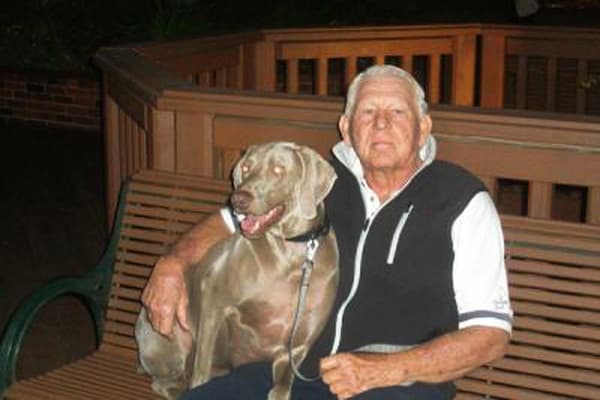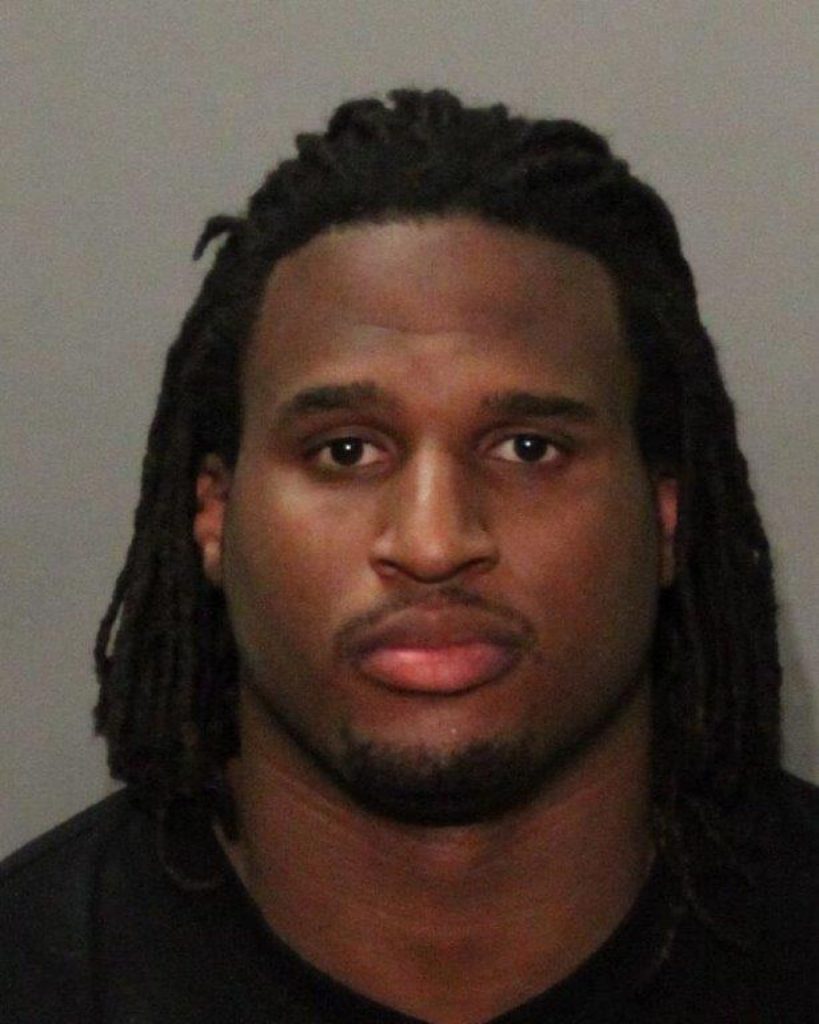Tia Katrina Taruc Canlas thought she had a strong case. Her client, Ellena Bondesson, was nine months pregnant when police found her in 2012, bound in handcuffs in the San Jose home she shared with her husband. Bondesson was chained to her bed with a dog leash, covered in bruises, with dried blood on her face and urine on her bed.
Investigators discovered Bondesson’s personal documents, including her passport and social security card, in the trunk of her husband’s car. A medical examination found evidence that she’d been raped. Bondesson said her husband, Silicon Valley real estate tycoon Clyde Berg, had raped her with his golf putter, which police found propped against her dresser. Bondesson told investigators that Berg chained her in her bedroom for days without food, held her at gunpoint, and forced her to take pills.
Police arrested Berg, and Santa Clara County prosecutors filed multiple felony criminal charges against him, including sexual assault. Berg, who made a fortune developing tech campuses, is the brother and business partner of billionaire Carl Berg, one of the richest people in the country. The sensational criminal case made international headlines when photos of Bondesson in her hospital bed with her bloody face became public.
But during a 2013 preliminary hearing, a judge threw out the charges against Berg, concluding that Bondesson had made up the whole story. The judge even went so far as to declare Berg factually innocent and sealed all of the court records.
At the time, Bondesson had already filed a lawsuit against Berg over the alleged rape and was in the middle of divorce proceedings with him. But then her attorneys quit, and a law professor at UC Berkeley heard about the case and referred it to a former student, Taruc Canlas. In 2011, Taruc Canlas had founded a nonprofit legal aid clinic in Berkeley for domestic violence survivors: the Alipato Project. Bondesson became Taruc Canlas’ second client.
The professor, Nancy Lemon, had inspired the Alipato Project years earlier when she pointed out that tort law was an often-overlooked recourse for domestic violence victims, but one that could be vital because battered women frequently find themselves financially dependent on their spouses or partners. According to the National Network to End Domestic Violence, abusers limit victims’ access to money in 98 percent of abusive relationships, depriving victims of the resources they need to leave.
So by helping victims sue their abusers, Taruc Canlas hopes to help give them a chance to attain their independence. “People can’t leave the relationship,” Taruc Canlas said during a recent interview at her Berkeley office. “If we had a better safety net in our society, it would be easier for people to leave. But we don’t. So for now, I’m trying to hold the batterers accountable — take their money to compensate the victims.”
Lemon told Taruc Canlas that Bondesson’s case was one of the worst she’d ever seen and concluded that Bondesson was suffering from severe trauma. When Taruc Canlas met Bondesson, she arrived with her baby and hundreds of pages of court documents.
“I read the [court] transcripts, and I saw they didn’t show all of the evidence that Ellena was showing me — like years and years of journal entries, mental health records, a diagnosis of PTSD from a psychiatrist that wasn’t ever brought up,” said Taruc Canlas.
Taruc Canlas thought that, based on the strength of the evidence, particularly a Sexual Assault Response Team nurse’s testimony that Bondesson had been raped and battered, the case was winnable, even against Berg’s high-priced attorneys. She filed an amended complaint on Bondesson’s behalf in March 2015.
But she lost the case in March 2016 when a jury ruled in Berg’s favor. Berg responded by filing a malicious prosecution suit against the Alipato Project and its volunteer lawyers — a suit that could have destroyed the small organization.
“I was very worried that the Alipato organization may not survive when I read the Berg vs. Alipato Project complaint,” Bondesson told the Express in an email. “The complaint and the timing of its filing indicated a desire to litigate just for the sake of litigation.”
Ultimately, the Alipato Project prevailed in that case, convincing Alameda County Superior Court Judge Julia Spain in July to toss Berg’s suit. The case also failed to dissuade Taruc Canlas from attempting to hold other domestic abusers accountable.
In fact, the same day Spain dismissed Berg’s lawsuit, Taruc Canlas filed a civil action against former San Francisco 49ers defensive end Ray McDonald, who had been arrested three times for alleged domestic violence against his ex-fiancée. He was charged with violating a restraining order in 2015 as well for an unrelated sexual assault, though the sexual assault charges were later dropped. The Alipato Project’s suit alleges an even more extensive history of abuse than has been publicly reported.
“It’s a very hard situation; I’m filing this lawsuit now to basically seek justice, to make Ray be held accountable for his actions, letting other women know it’s okay to speak out, as hard as it is, it’s okay,” said McDonald’s ex-fiancée, Kendra Scott.
Tia Katrina Taruc Canlas said that when she was 1 year old, her mother escaped her abusive father. Her mother had come to New York from the Philippines, but her immigration status was dependent on her husband’s student visa. So Taruc Canlas’s great-grandfather, the Filipino liberation leader Luis Taruc, leveraged his extensive network of connections in the United States to help her mother find a job and a home in California.
So when Taruc Canlas started her legal aid clinic in Berkeley to help victims of domestic violence sue their abusers, she named it after her great-grandfather’s war name: Alipato.
Taruc Canlas runs the organization from a single desk, upstairs from a cooperative coffee shop. Rent is cheap, and there’s plenty of room for an organization with only one employee. She pays herself $16 an hour for the 30 hours of work she puts in each week and does contract work on the side to make ends meet.
So far, she’s had a good success rate, winning settlements or judgments for four of her first five clients. Since finishing up her first five cases, Taruc Canlas has taken on three more, including Scott’s. She has several more clients on a waiting list and is trying to recruit more volunteer lawyers to help carry the workload.
The organization receives a commission from the settlements and judgments it obtains and does some fundraising, particularly through a radical feminist coloring book that Taruc Canlas sells at street fairs and in the downstairs coffee shop. Because of her organization’s shoestring budget, she still asks her clients to save up money for litigation expenses, like filing fees, a cost most law firms cover.
In addition to helping women escape, Taruc Canlas views lawsuits against abusers as an alternative to a criminal justice system that she says has failed many victims of domestic violence. Neither Berg nor McDonald has been convicted of a crime. Taruc Canlas says about half of her clients are suing people who for various reasons have escaped prosecution. “We’ve tried using the criminal justice system for many years now to end domestic violence, and I’m just trying to figure out another way to help end it,” Taruc Canlas said.
According to the most recent detailed data from the U.S. Bureau of Justice Statistics, there were nearly 2.2 million cases of violence involving a spouse, boyfriend, or girlfriend reported to police between 1998 and 2002. Additionally, over the same time period, there were an estimated 1.5 million incidents that weren’t reported to police.
In 42.7 percent of the unreported incidents involving a spouse, the victims said they didn’t report it because it was a personal matter, they were protecting the offender, or they were afraid of reprisal. For incidents involving a boyfriend or girlfriend, it was 61.3 percent. Among family violence crimes reported to police, 35.9 percent resulted in arrest, fewer are prosecuted, and even fewer still ended in conviction.
Domestic violence can be difficult to prosecute, as there are often few if any eyewitnesses and victims may be reluctant to testify, fearing retaliation or because they’re still invested in the relationship. When victims do testify, psychological trauma may have affected their memory.
The abuse can be deeply psychological. Abusers often control their victims for years and techniques like gaslighting can leave victims questioning their perception of reality.
“It’s not only under-prosecuted, it’s also a false solution,” Taruc Canlas said. “One reason I started the Alipato Project is I think that prisons are not helpful in rehabilitating violent people. Sometimes violent people go into prison and when they get out they’re even more violent, because they have been treated like animals with a bunch of other violent people.”
Originally from Sweden, Ellena Bondesson met Clyde Berg in 1995, when she was working as an au pair. She came to live with him two years later on a student visa; at the time, Bondesson was in her early 20s and Berg was nearly 60. They married in 2002 when Bondesson’s student visa ran out, and they signed a strict prenuptial agreement stipulating that they would have no children and Bondesson would get nothing in a divorce.
According to court documents, Bondesson later testified that Berg ultimately agreed to have children with her and signed off on fertility treatments. She became pregnant via a sperm donor, she said, and produced a disputed photocopied document that said Berg had agreed to pay for childcare and to pay her $2 million if they divorced.
Bondesson was the sole witness in the 2013 preliminary hearing and had a very difficult time getting through the five days of testimony. She testified through tears and left the witness stand twice, at one point spending the weekend in the hospital for anxiety. According to court transcripts of the hearing, Bondesson had difficulty remembering key details and shut down entirely the first time she was asked to recall aspects of her alleged abuse.
After hearing Bondesson’s testimony, Santa Clara County Superior Court Judge Ron Del Pozzo agreed with Berg’s defense attorneys, concluding that she was severely mentally ill and had fabricated the entire ordeal. The judge implied in his remarks that she created the entire gruesome scene mainly in the few minutes after she called 911 while she was waiting for deputies to arrive. Del Pozzo appeared to believe she was out for money, and it had all been part of a complicated plot in which Bondesson had attempted to swindle her husband out of millions of dollars.
A large part of the reason Del Pozzo concluded that she was unworthy of belief was because he found the idea that she could dial a cellphone using her nose or tongue while her hands were cuffed behind her back “ridiculous.”
Clyde Berg emailed Taruc Canlas more than 10 times during the civil case.
“If the tongue can’t dial, there is no trial in this case,” Del Pozzo quipped at the hearing.

The judge went on to accuse Bondesson of not cooperating with the Santa Clara County District Attorney’s office. But her retained attorneys, from the Nolan Barton Olmos firm in Palo Alto, bristled at the suggestion, saying that prosecutors didn’t relay key information like when Berg was no longer required to wear an electronic monitoring bracelet. The DA’s Office didn’t object to the bracelet being removed and never took steps to address continued harassment by Berg, they argued. Bondesson was suffering from post-traumatic stress disorder, they said, and the DA’s Office didn’t adequately take that into consideration, treating her contemptuously.
Deputy District Attorney Alison Filo responded by calling the allegations “defamatory” and threatened to report Bondesson’s attorneys to the state bar.
Bondesson told the Express that, in retrospect, she feels she never had the support of the DA’s Office. Communication was difficult, and Bondesson felt that Filo never had a good handle on her case. “I had really good attorneys representing me. But I did not have the support from the District Attorney’s office, or the Santa Clara County Sheriff’s Office to keep Mr. Berg from continuing to harass me, my daughter, and people related to us,” Bondesson wrote in an email to the newspaper.
Looking back, Bondesson thinks she made a mistake going forward with the criminal case against Berg. She said she would have left town immediately had she not had an infant daughter. She feared retaliation from Berg. “I regret ever showing up to the hearing in the first place,” she said.
But it wasn’t as if there was no evidence. Court documents reviewed by the Express reveal that the Santa Clara County Sheriff’s Office took numerous photographs of the scene after Bondesson was found, showing her comforter covered in blood and urine, and the phone, leash, and dog collar next to the bed. There were photos documenting her injuries as well, showing her covered in bruises and her face caked with dried blood.
“None of that was shown to the judge,” Taruc Canlas said. “So I thought that maybe in the preliminary hearing the whole history wasn’t shown very well and that a civil suit could be Ellena’s second chance in telling her story.”
Then as Taruc Canlas prepared for the trial — her first jury trial — she started receiving some of the same strange emailed taunts that Bondesson said she had been receiving for years. “Please buy a new suit,” Berg wrote in one directed at all three of Bondesson’s attorneys, including Taruc Canlas (the Express reviewed copies of the emails). “Looked like you slept in your clothes last time I saw you. We will be exposing her as a mentally ill liar per judge del poso [sic].”
Taruc Canlas said Berg emailed her more than 10 times over the course of the civil case. “It’s really weird for defendants to email the plaintiff’s lawyers,” she said. “It’s not something that’s done, especially because we’re not allowed to respond. But he kept emailing us, and one of the things that he would say is, ‘I’m going to sue you for malicious prosecution.'”
Taruc Canlas said that when she talked to jurors after the trial, she was dismayed when one juror asked her, “If it was so bad, why didn’t she leave?”
She was incredulous at the suggestion — she’s been working with rape and domestic violence survivors for a decade now and is fully aware of all the difficulties survivors have in leaving an abusive relationship: fear of retaliation, having nowhere to go, not having a support network to live outside of the relationship. She’s become so immersed in the work that she doesn’t even ask that question anymore.
But she forgot that she used to, and she forgot that the jurors would, too. “Even after the #WhyIStayed hashtag went viral, people still have a hard time grasping how dangerous it is to escape,” she said.
“We spent a lot of time having the SART nurse explain the extent of Ellena’s injuries and having the psychiatrist explain symptoms of PTSD. We spent a lot of time having Clyde Berg explain his vulgar and emotionally abusive emails and having Ellena describe many incidents she survived throughout their decade-long relationship. But maybe we didn’t spend enough time explaining why Ellena stayed.”

In February, Berg sued the Alipato Project for malicious prosecution, alleging that no reasonable attorney would have taken Bondesson’s case. He cited the judge’s ruling in the criminal case, as well as evidence, including Bondesson’s psychiatric history, previous statements she’d made to doctors that she had not been abused, and the fact that electricity had been used in the house during the two days Bondesson said she was chained to her bed.
Taruc Canlas countered that the suit was an attempt to impede her free speech and challenged it under California’s statute forbidding lawsuits that seek to silence people. Taruc Canlas successfully argued that Berg’s suit was an attempt to punish her and her client for exercising their Constitutional rights. But most of all she says the suit was meritless for one reason: She still believes Bondesson.
Throughout the criminal and civil cases, Berg talked extensively to a reporter from the San Jose Mercury News. But when the Express asked his attorneys if they will pursue any future litigation or would comment on the dismissal of the malicious prosecution suit, one of Berg’s lawyers, Michael Crosby, provided only this statement:
“In the criminal action, Clyde Berg was found factually innocent. The Hon. Ron M. Del Pozzo stated that Ellena Bondesson’s ‘testimony was unworthy of belief.’ Ms. Bondesson thereafter pursued a civil action against Mr. Berg. Mr. Berg prevailed in the trial of the civil action. A jury of Ms. Bondesson’s peers returned a verdict in favor of Mr. Berg on his malicious prosecution cause of action against Ms. Bondesson.”
For her part, Bondesson said she remains fearful of future litigation or harassment from Berg. While she says she has set up methods to keep Berg from finding or contacting her, her mother continues to receive communication from him.
“My life has been very tough since the ordeal,” she wrote in an email. “There is no way for me to protect myself and my daughter from the harassment Mr. Berg subjects us to continuously.”
Kendra Scott called 911 at 2:41 a.m. on Aug. 30, 2014, to report abuse by her then-fiancé, San Francisco 49ers defensive end Ray McDonald.
“Hello. I’d like to press for a domestic violence … my fiancé … he’s trying to pull me out of the house … he’s drunk…. I think he’s calling the cops, he, he’s trying to get me out,” she told the 911 dispatcher, according to a memo from the Santa Clara County District Attorney’s Office explaining its decision not to charge McDonald.
At the time, the National Football League was facing a fierce backlash over domestic violence by players. Baltimore Ravens running back Ray Rice had been arrested for assaulting his fiancée in an Atlantic City hotel in an incident that was captured on video. It showed Rice punching her unconscious and then dragging her out of an elevator. Two days before McDonald’s arrest, the NFL lengthened its suspensions for domestic violence from two games to six.
The Ravens terminated Rice’s contract not long after McDonald’s arrest, but the 49ers allowed McDonald, who was coming off one of his best seasons, to keep playing, with then head coach Jim Harbaugh lecturing reporters about due process under the law.
The McDonald domestic violence incident also exposed potentially improper relationships between the 49ers and members of the San Jose Police Department. Some officers had been moonlighting as private security for the team, including Sgt. Sean Pritchard who, while still on duty, was referred to McDonald’s house the night of his arrest by 49ers security.
McDonald had been celebrating his 30th birthday and called the team’s security detail because he said he was concerned that some women he had met the night before had come to his house.
Scott had been asleep upstairs when a friend told her that there were other women at the party getting too friendly with McDonald. She went downstairs to confront them and eventually ended up in a physical altercation. Scott told investigators she pushed McDonald first, but McDonald said she hit him multiple times with a closed fist. According to court documents, he grabbed her arms to restrain her, causing visible injuries. He then tried to forcibly remove her from the house, at one point grabbing her neck, again injuring her.
Two minutes before Scott’s 911 call, McDonald called Pritchard personally and said, “I need to get this female out of my house.”

Without eyewitnesses, the District Attorney’s Office concluded that Scott — a 5-foot-7, 125-pound woman — was in mutual combat with McDonald — a 6-foot-3, 290-pound NFL player who had 29 tackles in 2013.
“I was afraid to come forward,” Scott said in a recent phone interview. “In a sense, I didn’t feel the way the investigation was happening — with all the allegations and the relationship he had with the police and the NFL and all of that — I didn’t feel like I had the support I needed from the police.”
In addition to the lack of eyewitness evidence, the district attorney’s office also reported that Scott had declined to cooperate with further aspects of the investigation. Scott said that at the time, she was still seeking to protect McDonald and was afraid that pursuing a criminal case could cost McDonald his job with the 49ers.
“It’s hard to have your name and face and private matters be in public light and having outsiders make judgment on your life,” she added.
Scott’s lawsuit against McDonald, filed in July, describes a much more extensive history of alleged abuse than had previously been publicly disclosed. They started dating in 2012 and got engaged and moved in together in February 2014. Shortly after that, he started calling her names such as “whore” and “gold digger,” the suit alleges.
In March of that year, they got into a fight while on their way home and McDonald forced her out of the car, leaving her stranded for two hours until he came back to pick her up. In May, Scott was at a party at a bar in Burlingame when McDonald dragged her out of the bar and into his car. In June, he hit Scott and a friend she was with, and then he dragged Scott down the stairs, according to the suit. She fell and hit her head on the cement outside, knocking her unconscious. The assault caused bruises on her face and arms, according to the suit. In July, he body-slammed her, dragged her across the floor, and punched her in the face, she said. She escaped to a fast food restaurant and got ice for her face, which was bleeding and swollen.
Attorneys for McDonald did not return requests for comment for this report.
According to the DA’s office, there was only one incident when police were called to McDonald’s home prior to the birthday party, and it was McDonald, not Scott, who made the call. On May 24, 2014, McDonald reported that Scott had a gun but denied that she had pointed it at him or fired it. Scott denies that she ever threatened McDonald with a gun, saying that he had threatened her with it on previous occasions, and during an argument, she grabbed it first, afraid that he would threaten her again.
She ended the relationship for good that December, when McDonald was named a suspect in a sexual assault case. That was the last straw for the 49ers as well. The team cut him, citing “a pattern of poor decision-making.” He was later indicted for the sexual assault, but the charges were dropped when the victim refused to testify.
McDonald’s teammate, linebacker Ahmad Brooks, was also charged with sexual battery for an incident at the same party involving the same woman. His charges are still pending, and the 49ers kept him on the team until finally cutting him last month. Shortly after that, he signed a $5 million deal with the Green Bay Packers.
After McDonald was released by the 49ers, the Chicago Bears signed him, but then released him after police arrested him again for another incident involving Scott. That time, he violently confronted her in her home in Santa Clara while she had their 2-month-old son in her arms, according to court documents. She recorded the incident on video and obtained a restraining order, which McDonald violated two days later.
Charges are still pending for the restraining order violation, and the case is set to go to trial. Jury selection is scheduled to begin on Sept. 18.
In Tagalog, Alipato means “the spark that spreads the fire” or “a small glowing ember that escapes a dying fire.”
In addition to fighting the Japanese occupation to liberate the Filipino people during World War II, Luis Taruc fought hard for the liberation of Taruc Canlas’s mother. “‘When you were little, I wouldn’t even let a fly touch your skin, and now this guy hurts you like that?'” Taruc Canlas recalled her great-grandfather said.
She sees each case she takes as the spark that spreads the fire of holding abusers accountable and deterring abusers from misconduct. While most of her litigation targets aren’t rich and powerful — one even declared bankruptcy just after she sued him — Taruc Canlas hasn’t shied away from taking on challenging cases.
“We take those difficult cases because hopefully one day a jury will side with us and see that domestic violence doesn’t have a class. Rich people batter; poor people batter. It also doesn’t have an ethnicity or race,” she said. “Hopefully, by showing that wealthy people who can get whatever they want also take whatever they want will prove to others that we can hold them accountable and help other victims step forward.”


![[Tribune Tower building]](https://www.oaklandreporter.org/wp-content/uploads/2017/06/tribune-tower-13th-street-1024x685.jpg)